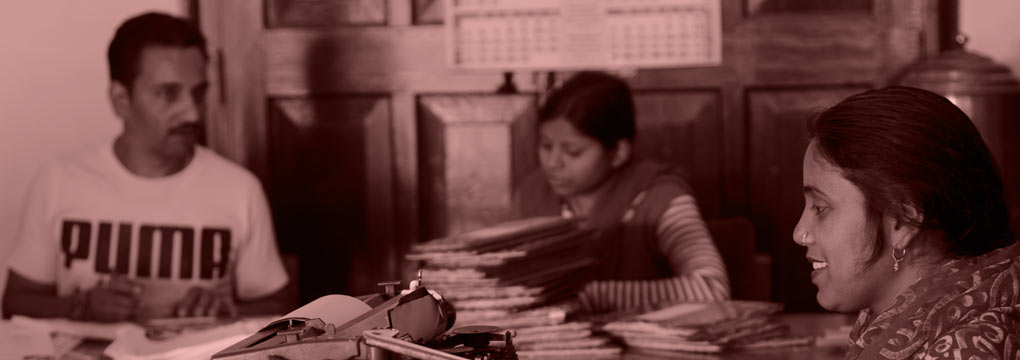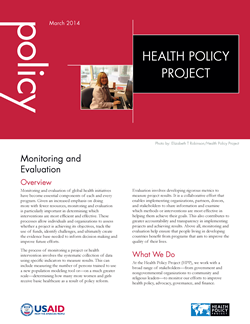The Health Policy Project ended in 2016. Work continued under Health Policy Plus (HP+) until 2022.
Monitoring and Evaluation

Health Policy Project/India
Overview
Monitoring and evaluation of global health initiatives have become essential components of each and every program. Given an increased emphasis on doing more with fewer resources, monitoring and evaluation is particularly important in determining which interventions are most efficient and effective. These processes allow individuals and organizations to assess whether a project is achieving its objectives, track the use of funds, identify challenges, and ultimately create the evidence base needed to inform decision making and improve future efforts.
The process of monitoring a project or health intervention involves the systematic collection of data using specific indicators to measure results. This can include measuring the number of persons trained to use a new population modeling tool or—on a much greater scale—determining how many more women and girls receive basic healthcare as a result of policy reform.
Evaluation involves developing rigorous metrics to measure project results. It is a collaborative effort that enables implementing organizations, partners, donors, and stakeholders to share information and examine which methods or interventions are most effective in helping them achieve their goals. This also contributes to greater accountability and transparency in implementing projects and achieving results. Above all, monitoring and evaluation help ensure that people living in developing countries benefit from programs that aim to improve the quality of their lives.
What We Do
At the Health Policy Project (HPP), we work with a broad range of stakeholders—from government and nongovernmental organizations to community and religious leaders—to monitor our efforts to improve health policy, advocacy, governance, and finance. Whether it is measuring the number of family planning policies adopted or trained midwives overseeing childbirth, we strive to carefully evaluate performance and continuously seek ways to maximize the impact of the project’s results.
Some examples of our monitoring and evaluation work include
- Measuring the impact of increased health financing on improving access to equitable health services
- Determining how reforms are adopted in national policies and budgets and the effect of advocacy on their implementation
- Identifying best practices in the scale-up of family planning and HIV programs
- Analyzing the effect of advocacy and policy work on reducing stigma and discrimination, as part of the overall effort to expand access to health and HIV services
- Evaluating the impact of integrating gender equality into policies that govern health systems and whether it leads to improvements in service delivery, especially among women and girls
- Monitoring the participation of marginalized populations in engaging in civic dialogue about the effectiveness and reach of services provided by national governments
- Determining the impact of coordination across different sectors on improving health policy
- Examining how integrating cross-cutting issues like gender equity or stigma and discrimination into projects influences policies that result in increased equitability of health services
In addition, we work to strengthen the capacity of in-country partners to enhance their monitoring and evaluation skills. This helps foster ownership and promotes sustainable interventions that improve the health and well-being of people living in the countries in which we work.


